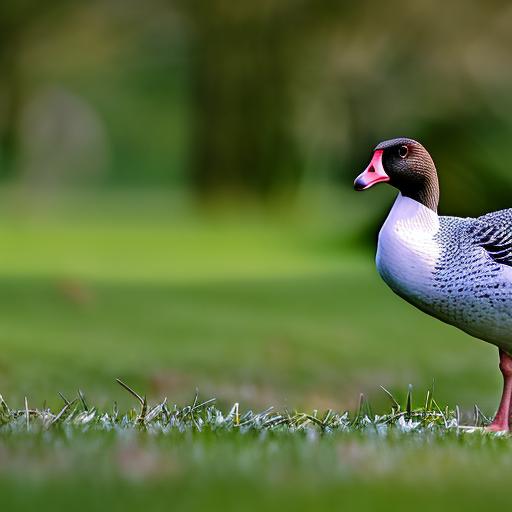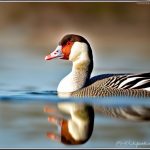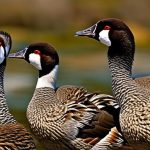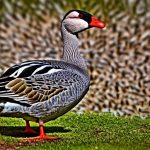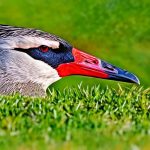Geese are large waterfowl that are commonly found in many parts of the world. They are known for their distinctive honking sound and their V-shaped flying formation. Geese are social animals that live in flocks and are often seen in parks, lakes, and other open areas. They have a strong sense of community and will often stay together in family groups.
Understanding the habits of geese is important for effective control. Geese can cause damage to lawns and gardens, and their droppings can pose health risks. By understanding their behavior and implementing appropriate control measures, it is possible to prevent geese infestations and minimize the damage they can cause.
Key Takeaways
- Geese are migratory birds that are attracted to open spaces with water and grass.
- Geese can cause damage to lawns, gardens, and property, as well as pose health risks with their droppings.
- Natural deterrents such as landscaping, decoys, and dogs can help keep geese away.
- Physical barriers like fences, netting, and spikes can prevent geese from entering your property.
- Sound and light-based repellents, as well as chemical repellents, can also be effective in controlling geese.
Understanding the Risks of Geese on Your Lawn
Geese can cause significant damage to lawns and gardens. They have a voracious appetite and will graze on grass, plants, and crops, causing them to become damaged or destroyed. This can result in unsightly patches of bare ground and can be costly to repair.
In addition to the damage they cause, geese droppings can also pose health risks. Their droppings contain bacteria that can contaminate water sources and spread diseases such as E. coli and salmonella. This can be particularly concerning if you have children or pets that play on your lawn.
Taking action to prevent geese infestations is important to protect your property and ensure the health and safety of your family. By implementing effective control measures, you can deter geese from your lawn and minimize the risks they pose.
Natural Deterrents for Keeping Geese Away
There are several natural deterrents that can be used to keep geese away from your lawn. Planting certain types of vegetation that geese find unappealing can help deter them from landing on your property. Geese prefer short grass, so planting taller grasses or native plants can make your lawn less attractive to them.
Using decoys can also be an effective way to trick geese into thinking predators are present. Placing decoy predators such as plastic owls or coyotes in your yard can create the illusion of danger and discourage geese from landing.
Installing birdhouses to attract natural predators of geese, such as hawks or owls, can also help keep geese away. These predators will prey on geese and their presence can deter them from your property.
Physical Barriers to Prevent Geese from Entering Your Property
Physical barriers can be an effective way to prevent geese from entering your property. Fencing options such as wire mesh or electric fences can be installed to keep geese out. It is important to ensure that the fence is tall enough to prevent geese from flying over it and that it is securely anchored to the ground to prevent them from going under it.
Netting can also be used to prevent geese from landing on your lawn. By installing netting over areas where geese are likely to land, you can create a physical barrier that prevents them from accessing your property.
Another option is to install motion-activated sprinklers that scare geese away. These sprinklers are triggered by movement and will spray water when geese approach, causing them to retreat.
Sound and Light-Based Repellents for Geese Control
Sound and light-based repellents can be effective in deterring geese from your lawn. Loud noises, such as clapping or banging pots and pans together, can startle geese and cause them to fly away. Playing predator calls, such as those of hawks or eagles, can also deter geese by creating the illusion of danger.
Installing strobe lights can disorient geese and make it difficult for them to navigate your lawn. The flashing lights can confuse and scare them away.
Chemical Repellents for Geese Control
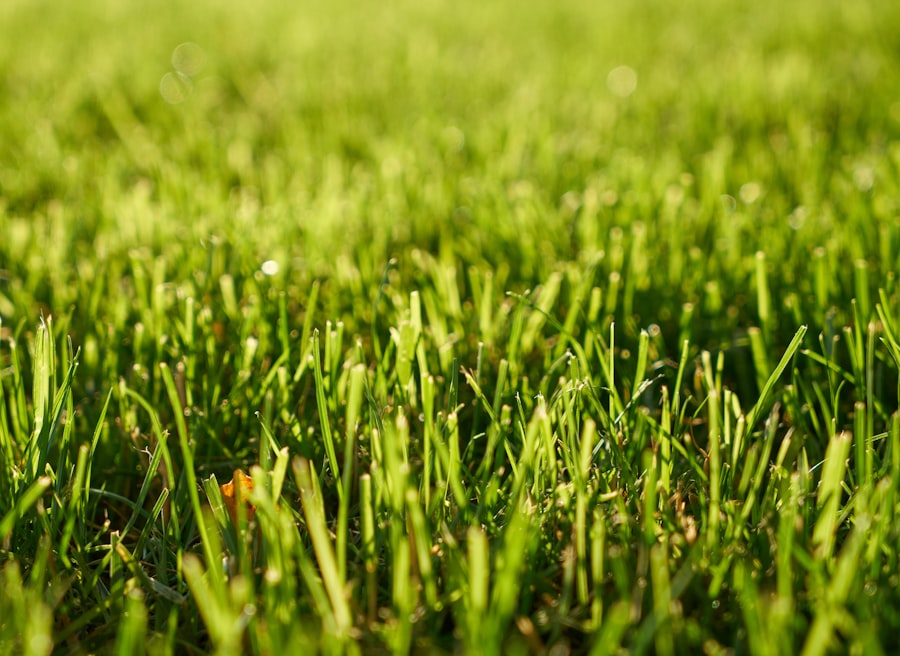
There are various chemical repellents available that can be used to deter geese from your lawn. These repellents typically contain ingredients that geese find unappealing, such as methyl anthranilate or capsaicin.
When using chemical repellents, it is important to use caution and follow the instructions carefully. Some repellents may be harmful to pets or other wildlife, so it is important to choose products that are safe for use in your specific situation.
Tips for safe and effective use of chemical repellents include applying them in areas where geese are likely to land or graze, reapplying them regularly as directed, and avoiding contact with the repellent yourself.
Scare Tactics for Deterring Geese from Your Lawn
Scare tactics can be an effective way to deter geese from your lawn. One common scare tactic is the use of scarecrows. Placing scarecrows in your yard can create the illusion of a human presence and deter geese from landing.
Hanging reflective objects, such as aluminum foil strips or old CDs, can also scare geese away. The movement and reflection of light can startle them and make them feel unsafe.
Installing wind chimes can create noise and movement that can deter geese. The sound of the chimes can be unsettling to geese and discourage them from landing on your lawn.
Creating a Less Attractive Environment for Geese
Creating a less attractive environment for geese can help deter them from your lawn. Removing sources of food and water, such as bird feeders or standing water, can make your property less appealing to geese.
Keeping your lawn well-maintained can also discourage geese from landing. Regularly mowing the grass, removing weeds, and keeping the area clean and tidy can make it less inviting for geese.
Using natural repellents, such as vinegar or citrus, can also make your lawn less appealing to geese. Spraying a mixture of vinegar and water or placing citrus peels around your lawn can create a scent that geese find unappealing.
The Importance of Consistency in Geese Control Methods
Consistency is key when it comes to geese control. It is important to stick to a consistent geese control plan in order to effectively deter geese from your lawn. Geese are intelligent animals and will quickly learn if certain deterrents are not consistently enforced.
Creating a geese control schedule can help ensure that you are consistently implementing control measures. This can include regular maintenance tasks such as mowing the lawn, removing weeds, and checking for signs of geese infestations.
Monitoring your lawn for signs of geese infestations is also important. This can include looking for droppings, tracks, or other evidence of geese activity. By regularly monitoring your lawn, you can quickly identify any issues and take appropriate action.
Seeking Professional Help for Geese Infestations on Your Lawn
In some cases, it may be necessary to seek professional help for geese infestations on your lawn. If you have tried various control methods and are still experiencing issues with geese, it may be time to call in a professional.
Professional geese control services have the knowledge and experience to effectively deter geese from your property. They can assess the situation, recommend appropriate control measures, and implement them in a safe and effective manner.
When choosing a professional geese control company, it is important to choose a reputable and experienced provider. Look for companies that have a proven track record of success and positive customer reviews. It is also important to ensure that the company uses humane methods of geese control and follows all applicable laws and regulations.
In conclusion, understanding the habits of geese and implementing appropriate control measures is important for effective geese control. Geese can cause damage to lawns and gardens, and their droppings can pose health risks. By using natural deterrents, physical barriers, sound and light-based repellents, chemical repellents, scare tactics, and creating a less attractive environment for geese, it is possible to prevent geese infestations and minimize the risks they pose. Consistency in geese control methods is important, and seeking professional help may be necessary in some cases. By taking action to prevent geese infestations, you can protect your property and ensure the health and safety of your family.
If you’re looking for effective ways to keep geese away from your lawn, you might also be interested in learning about the benefits of keeping guinea fowl. Guinea fowl are known for their ability to deter pests and can be a great addition to your backyard flock. To find out more about whether guinea fowl can live with chickens, check out this informative article on poultrywizard.com. Additionally, if you’re considering raising chickens for your family’s needs, you may want to read up on how many chickens you need for a family of four. Discover the ideal number and other helpful tips at poultrywizard.com. Lastly, if you’re wondering where to put your chicken coop for optimal results, this article on poultrywizard.com provides valuable insights.
FAQs
What are some effective ways to keep geese away from my lawn?
There are several effective ways to keep geese away from your lawn, including using decoys, installing fencing, using repellents, and modifying the landscape.
What type of decoys can I use to keep geese away from my lawn?
You can use a variety of decoys to keep geese away from your lawn, including predator decoys, swan decoys, and coyote decoys.
What type of fencing is best for keeping geese away from my lawn?
The best type of fencing for keeping geese away from your lawn is a physical barrier that is at least 3 feet tall and has small openings that prevent geese from getting through.
What type of repellents can I use to keep geese away from my lawn?
You can use a variety of repellents to keep geese away from your lawn, including sound repellents, visual repellents, and taste repellents.
How can I modify my landscape to keep geese away from my lawn?
You can modify your landscape to keep geese away from your lawn by removing any standing water, trimming grass to a height of 4 inches or more, and planting vegetation that geese do not like to eat.
Meet Walter, the feathered-friend fanatic of Florida! Nestled in the sunshine state, Walter struts through life with his feathered companions, clucking his way to happiness. With a coop that’s fancier than a five-star hotel, he’s the Don Juan of the chicken world. When he’s not teaching his hens to do the cha-cha, you’ll find him in a heated debate with his prized rooster, Sir Clucks-a-Lot. Walter’s poultry passion is no yolk; he’s the sunny-side-up guy you never knew you needed in your flock of friends!

